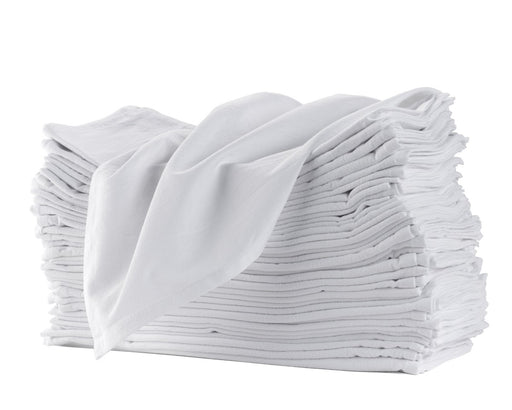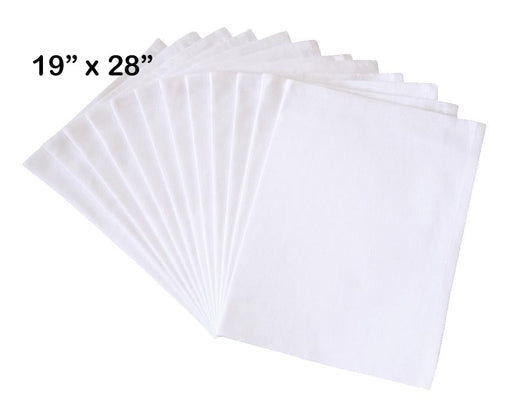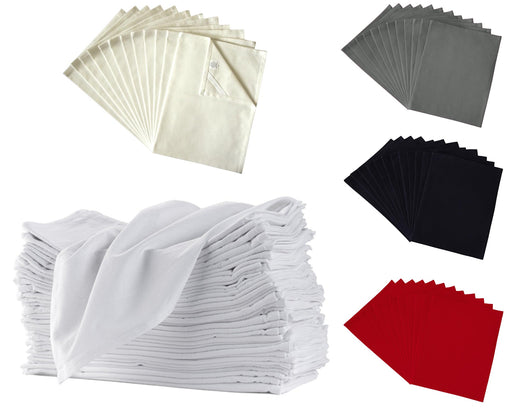Continental U.S. only.
Continental U.S. only.
Did you know that Americans discard an overage of 3,000 tons of disposable paper products such as paper towels and napkins every day? This not only represents a significant waste as these paper products all end up in landfills, but single-use paper products also have a profound impact on the environment due to the chemicals they contain and the resources that go into producing them. Yet, in our increasingly fast-paced world, we have come to rely on paper towels in our kitchens and bathrooms due to the convenience they provide. However, this convenience comes with a hefty environmental cost, meaning that it may be time to rethink our reliance on these single-use paper products. As we strive to create a more sustainable world that does not rely so much on single-use products, tea towels have emerged as a great alternative to paper towels in the kitchen.

While tea towels are not a new concept, having been in use for hundreds of years, they have seen a resurgence in popularity in recent years as a sustainable alternative to using paper towels. Since flour sack tea towels are reusable and made from organic materials, incorporating them into your daily routine can help significantly reduce your household's impact on the environment. Yet, you may find yourself wondering why paper towels are so bad for the environment, and what sets tea towels apartment as a more sustainable option. Keep reading as we take a look at the impact of paper towels on the environment and the benefits of switching to eco-friendly custom tea towels.
For decades, Americans have considered paper towels a household staple, as they provide a convenient option for drying your hands and cleaning up messes without creating more dirty laundry. However, as society becomes more concerned about the growing impact of climate change, more households have begun to reevaluate their reliance on disposable products such as paper towels; and this is understandable considering the environmental impact paper towels have. Here is a breakdown of some of the biggest problems that come with using paper towels on a regular basis.
Our planet's forests are one of its most vital resources. These dense collections of trees act as the planet's lungs, absorbing damaging greenhouse gases and emitting the oxygen so vital to our survival. However, paper towels and other disposable paper products have had a devastating impact on our forests. While we often do not give much thought to where our paper towels come from, thousands of trees are cut down every day to satisfy our need for paper products. In fact, Americans use an average of 13 billion pounds of paper towels every year, requiring a staggering 6.5 million trees to be cut down to keep up with this demand. This deforestation has a devastating impact on our planet by disrupting delicate ecosystems, threatening indigenous communities, and leading to increased levels of greenhouse gasses.
Not only does paper towel production threaten our environment by eliminating our planet's forests, but the process of creating paper towels is also extremely energy intensive. Before paper towels reach the shelves at your local store, trees must first be cut down, transported to factories, and then chipped into small pieces. The wood chips are then mixed with water and chemicals to create pulp. This pulp is then flattened into sheets and goes through a dryer, which uses large amounts of energy. Finally, these sheets are pressed, cut, and packaged for distribution. The process of turning trees into paper towels uses a great deal of energy, creating significant amounts of carbon emissions at each step of the way. This is a lot of energy to waste for a product that will be used once and then thrown in the trash.
Landfills are becoming increasingly problematic for our society, as the massive amounts of waste we produce every day is causing landfills to become overloaded. Not only are these landfills taking up increasingly large amounts of valuable space, but they also pose an environmental hazard due to the greenhouse gasses they produce, accelerating climate change. Additionally, many of the products that enter landfills contain toxic chemicals that can leach into the ground, contaminating local water supplies. Unfortunately, since paper towels are designed to be disposable, billions of pounds of them are sent to landfills each year, adding to the problem of landfill overload.
There is a common misconception that paper towels are an all-natural option since they are made from wood. However, traditional paper towels often contain a mix of chemicals to make them whiter, softer, and give them a pleasant smell including chlorine, dioxin, and formaldehyde. These chemicals are not only harmful to human health, with formaldehyde being a known carcinogen, but as these paper towels decompose in landfills, these chemicals are then released into the ground and atmosphere, which can have devastating consequences for the environment.
If paper towels are so bad for the environment, you may find yourself wondering if there is a better alternative for quickly cleaning up spills, washing vegetables, and drying your hands when you're on the go. As we previously mentioned, more people are turning to tea towels as an alternative to paper towels. Of course, if you've never used a tea towel, you may find yourself asking what a tea towel even is.
Tea towels are thin, food-safe kitchen towels that are durable, absorbent, and quick drying, making them a great multipurpose kitchen accessory that can provide an environmentally-friendly alternative to paper towels. Tea towels get their name from their original use in 18th-century Europe when people would use these thin cotton towels to line tea trays, insulate teapots, and cover baskets of finger foods. However, modern tea towels are extremely versatile and can be used for numerous functions. They are particularly popular as accessories in kitchens and bathrooms, as they often feature decorative designs, patterns, and embroidery that help bring personal style to the room.
If you're ready to ditch paper towels, consider switching to eco-friendly flour sack tea towels. Unlike disposable paper towels, tea towels are reusable, and they're made from natural materials. By ditching paper towels in favor of tea towels, you can then significantly reduce your household's carbon footprint. While it can be difficult to imagine ditching the convenience of paper towels, here are just a few of the eco-friendly benefits of choosing to switch to tea towels instead.
Considering the growing problem landfills are becoming, anything that we can do to limit our use of disposable products can go a long way in helping the environment. Fortunately, tea towels are reusable, providing a more environmentally friendly alternative to paper towels. While they do need to be washed, modern washing machines are efficient and use little water or electricity. As long as you wash your tea towels along with a full load of laundry, reusing tea towels is much more environmentally friendly than paper towels. To make using tea towels just as convenient as paper towels, consider buying them in bulk so that you don't have to wash them as frequently.
Not only are paper towels bad for the environment, but they aren't a very efficient way to clean up spills as they aren't very absorbent. Even a small spill may require five or more paper towels to clean up the mess. Alternatively, while flour sack tea towels are thin, their unique fabrication makes them extremely absorbent as they're made from cotton that's diagonally woven. With a single tea towel, you can clean up large messes, and then you can just throw it in the wash and use it again, significantly reducing waste compared to using paper towels.
Their diagonal weave also makes tea towels extremely durable. Thusly, while purchasing tea towels requires a bigger upfront investment than buying paper towels, they are made to last and will save money and reduce your carbon footprint in the long run.
As we previously mentioned, traditional paper towels contain chemicals that can be toxic to the environment as well as hazardous to your health. Fortunately, this is not a concern with tea towels if you choose ones made with chemical-free cotton. One option would be tea towels made with Oeko-Tex-certified cotton. Oeko-Tex certification ensures that the cotton used to make the towels is free from harmful substances such as chemical pesticides, chlorine bleach, and formaldehyde. Choosing Oeko-Tex-certified cotton tea towels as an alternative to paper towels will then support sustainability, protect your health, and ensure a greener home environment.
Perhaps the best thing about tea towels is that they are beautiful to look at. Unlike paper towels which are bland and just sit on the counter, tea towels come in various patterns and designs, allowing you to express your personality and enhance your kitchen's decor. If you are thinking of switching to tea towels, consider investing in custom tea towels. With Mary's Kitchen Flour Sack Towels, you can use your own design to make custom tea towels that enhance your decor, blending beauty, functionality, and sustainability.
Feel free to contact us to learn more about the environmental benefits of using tea towels in your kitchen.

If you need red, gray, blue or black color please click here. ★ Multipurpose, available white or natural colors (unbleached), matching, wholesale ...
View full details
Custom Printed Flour Sack Towels ★ Current Production Time: 3–4 Weeks WHOLESALE | RESELLERS | DESIGNERS ✅ Everyone is welcome to order! If you'r...
View full details
100% Cotton, comes in white (bleached) and natural (unbleached) color A uniform 19" x 28" rectangle, 130 thread count, flour sack napkins hemmed...
View full details
100% Cotton A uniform 27" x 27" square, 130 thread count, 3 oz each heavyweight flour sack dish towels and hemmed on all sides A corner loop for...
View full details
Attention Re-sellers, Wholesalers, and Designers: If you need to order more than 100 pieces, please contact us for our special wholesale pri...
View full details